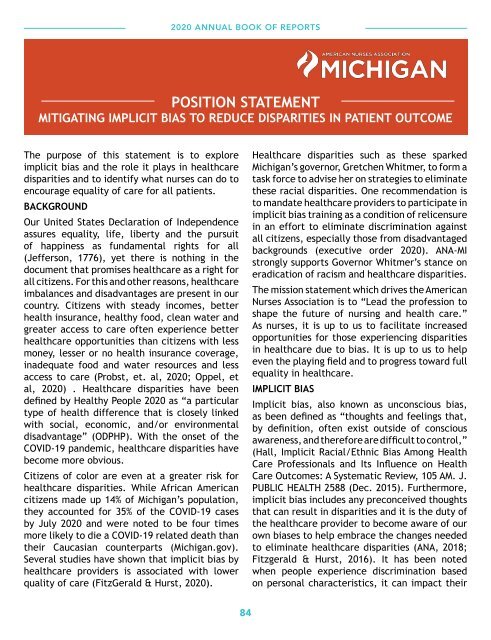ANA-Michigan - 2020 Annual Book of Reports
You also want an ePaper? Increase the reach of your titles
YUMPU automatically turns print PDFs into web optimized ePapers that Google loves.
<strong>2020</strong> ANNUAL BOOK OF REPORTS<br />
POSITION STATEMENT<br />
MITIGATING IMPLICIT BIAS TO REDUCE DISPARITIES IN PATIENT OUTCOME<br />
The purpose <strong>of</strong> this statement is to explore<br />
implicit bias and the role it plays in healthcare<br />
disparities and to identify what nurses can do to<br />
encourage equality <strong>of</strong> care for all patients.<br />
BACKGROUND<br />
Our United States Declaration <strong>of</strong> Independence<br />
assures equality, life, liberty and the pursuit<br />
<strong>of</strong> happiness as fundamental rights for all<br />
(Jefferson, 1776), yet there is nothing in the<br />
document that promises healthcare as a right for<br />
all citizens. For this and other reasons, healthcare<br />
imbalances and disadvantages are present in our<br />
country. Citizens with steady incomes, better<br />
health insurance, healthy food, clean water and<br />
greater access to care <strong>of</strong>ten experience better<br />
healthcare opportunities than citizens with less<br />
money, lesser or no health insurance coverage,<br />
inadequate food and water resources and less<br />
access to care (Probst, et. al, <strong>2020</strong>; Oppel, et<br />
al, <strong>2020</strong>) . Healthcare disparities have been<br />
defined by Healthy People <strong>2020</strong> as “a particular<br />
type <strong>of</strong> health difference that is closely linked<br />
with social, economic, and/or environmental<br />
disadvantage” (ODPHP). With the onset <strong>of</strong> the<br />
COVID-19 pandemic, healthcare disparities have<br />
become more obvious.<br />
Citizens <strong>of</strong> color are even at a greater risk for<br />
healthcare disparities. While African American<br />
citizens made up 14% <strong>of</strong> <strong>Michigan</strong>’s population,<br />
they accounted for 35% <strong>of</strong> the COVID-19 cases<br />
by July <strong>2020</strong> and were noted to be four times<br />
more likely to die a COVID-19 related death than<br />
their Caucasian counterparts (<strong>Michigan</strong>.gov).<br />
Several studies have shown that implicit bias by<br />
healthcare providers is associated with lower<br />
quality <strong>of</strong> care (FitzGerald & Hurst, <strong>2020</strong>).<br />
Healthcare disparities such as these sparked<br />
<strong>Michigan</strong>’s governor, Gretchen Whitmer, to form a<br />
task force to advise her on strategies to eliminate<br />
these racial disparities. One recommendation is<br />
to mandate healthcare providers to participate in<br />
implicit bias training as a condition <strong>of</strong> relicensure<br />
in an effort to eliminate discrimination against<br />
all citizens, especially those from disadvantaged<br />
backgrounds (executive order <strong>2020</strong>). <strong>ANA</strong>-MI<br />
strongly supports Governor Whitmer’s stance on<br />
eradication <strong>of</strong> racism and healthcare disparities.<br />
The mission statement which drives the American<br />
Nurses Association is to “Lead the pr<strong>of</strong>ession to<br />
shape the future <strong>of</strong> nursing and health care.”<br />
As nurses, it is up to us to facilitate increased<br />
opportunities for those experiencing disparities<br />
in healthcare due to bias. It is up to us to help<br />
even the playing field and to progress toward full<br />
equality in healthcare.<br />
IMPLICIT BIAS<br />
Implicit bias, also known as unconscious bias,<br />
as been defined as “thoughts and feelings that,<br />
by definition, <strong>of</strong>ten exist outside <strong>of</strong> conscious<br />
awareness, and therefore are difficult to control,”<br />
(Hall, Implicit Racial/Ethnic Bias Among Health<br />
Care Pr<strong>of</strong>essionals and Its Influence on Health<br />
Care Outcomes: A Systematic Review, 105 AM. J.<br />
PUBLIC HEALTH 2588 (Dec. 2015). Furthermore,<br />
implicit bias includes any preconceived thoughts<br />
that can result in disparities and it is the duty <strong>of</strong><br />
the healthcare provider to become aware <strong>of</strong> our<br />
own biases to help embrace the changes needed<br />
to eliminate healthcare disparities (<strong>ANA</strong>, 2018;<br />
Fitzgerald & Hurst, 2016). It has been noted<br />
when people experience discrimination based<br />
on personal characteristics, it can impact their<br />
84

















